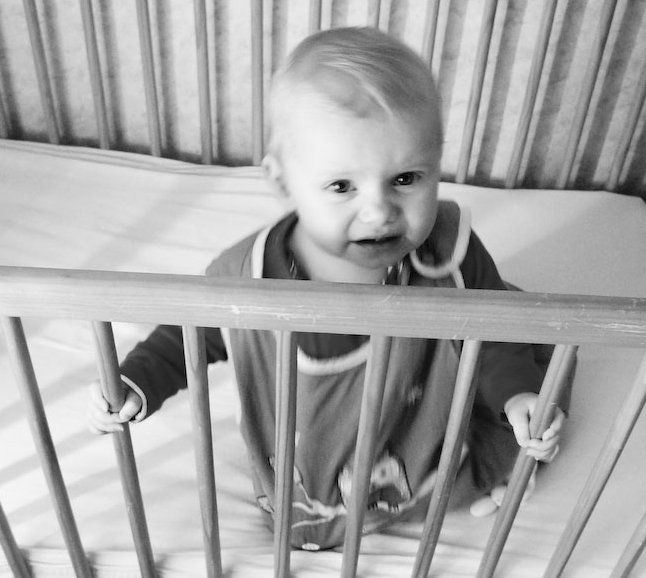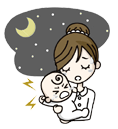Les troubles du sommeil chez l’enfant ont de graves conséquences 1. Les difficultés d'endormissement ou de maintien du sommeil (insomnie) causent une réduction de la durée et de la qualité du sommeil qui engendrent des :
· Difficultés de l’apprentissage et de moins bonnes performances scolaires 2
· Troubles de l’humeur comme la dépression, l’irritabilité 3,4
· Un risque accru de suicide chez l’adolescent 5
· Une moins bonne santé, les enfants qui dorment mal souffrent plus d’infections 6
· Une augmente des risques d’obésité 7-12
Certaines études montrent que les troubles du sommeil de la petite enfance, s’ils ne sont pas traités dès le début de la vie, persisteront avec l’âge 13-15. Certains troubles du sommeil de l’enfant sont chroniques, d’autres temporaires mais même dans ce cas ils présentent des effets à long terme sur toute la famille 16:
· insomnie chez les parents 17
· problèmes conjugaux 18
· dépression 19.
L’insomnie et les pleurs aboutissent trop fréquemment à des maltraitances 20,21.
Les troubles du sommeil de l’enfant ne sont donc pas à banaliser.

Références scientifiques :
- Mindell, J. A., & Durand, V. M. (1993). Treatment of childhood sleep disorders: generalization across disorders and effects on family members. Journal of pediatric psychology, 18(6), 731–50. (LISEZ)
- Randazzo, A., et al. (1998). Cognitive function following acute sleep restriction in children ages 10-14. Sleep, 21(8), 861–8. (LISEZ)
- Liu, X., et al. (2007). Insomnia and hypersomnia associated with depressive phenomenology and comorbidity in childhood depression. Sleep, 30(1), 83–90. (LISEZ)
- Nrugham, L., et al. (2008). Specific depressive symptoms and disorders as associates and predictors of suicidal acts across adolescence. Journal of affective disorders, 111(1), 83–93. (LISEZ)
- Liu, X. (2004). Sleep and adolescent suicidal behavior. Sleep, 27(7), 1351–8. (LISEZ)
- Chen, M-Y., et al. (2006). Adequate sleep among adolescents is positively associated with health status and health-related behaviors. BMC public health, 6, 59. (LISEZ)
- Al Mamun, A., et al. (2007). Do childhood sleeping problems predict obesity in young adulthood? Evidence from a prospective birth cohort study. American journal of epidemiology, 166(12), 1368–73. (LISEZ)
- Chaput, J-P., et al. (2006). Relationship between short sleeping hours and childhood overweight/obesity: results from the “Québec en Forme” Project. International journal of obesity (2005), 30(7), 1080–5. (LISEZ)
- Chen, X., et al. (2008). Is sleep duration associated with childhood obesity? A systematic review and meta-analysis. Obesity (Silver Spring, Md.), 16(2), 265–74. (LISEZ)
- Eisenmann, J.C. (2006). Insight into the causes of the recent secular trend in pediatric obesity: Common sense does not always prevail for complex, multi-factorial phenotypes. Preventive medicine, 42(5), 329–35. (LISEZ)
- Reilly, J., et al. (2005). Early life risk factors for obesity in childhood: cohort study. BMJ (Clinical research ed.), 330(7504), 1357. (LISEZ)
- Sekine, M., et al. (2002). A dose-response relationship between short sleeping hours and childhood obesity: results of the Toyama Birth Cohort Study. Child: care, health and development, 28(2), 163–70. (LISEZ)
- Kataria, S., et al. (1987). Persistence of sleep disturbances in preschool children. Journal of Pediatrics, 110, 642–646. (LISEZ)
- Touchette, E., et al. (2005). Bed-wetting and its association with developmental milestones in early childhood. Archives of pediatrics & adolescent medicine, 159(12), 1129–34. (LISEZ)
- Zuckerman, B., et al. (1987). Sleep problems in early childhood: continuities, predictive factors and behavioural correlates. Pediatrics, 80, 664–671. (LISEZ)
- Quine, L. (2001). Sleep problems in primary school children: comparison between mainstream and special school children (UK Blackwe.). Canterbury.
- Boergers, J., et al. (2007). Child sleep disorders: associations with parental sleep duration and daytime sleepiness. Journal of family psychology , 21(1), 88–94. (LISEZ)
- Meijer, A., & van den Wittenboer, G. (2007). Contribution of infants’ sleep and crying to marital relationship of first-time parent couples in the 1st year after childbirth. Journal of family psychology , 21(1), 49–57. (LISEZ)
- Hiscock, H., & Wake, M. (2002). Randomised controlled trial of behavioural infant sleep intervention to improve infant sleep and maternal mood. BMJ (Clinical research ed.), 324(7345), 1062–5. (LISEZ)
- Flaherty, E.G. (2006). Analysis of caretaker histories in abuse: comparing initial histories with subsequent confessions. Child abuse & neglect, 30(7), 789–98. (LISEZ)
- Reijneveld, S., et al. (2004). Infant crying and abuse. Lancet, 364(9442), 1340–2. (LISEZ)

